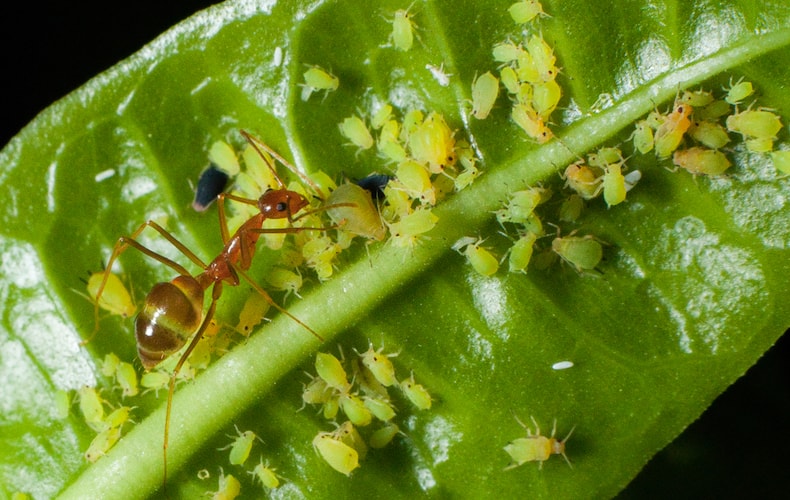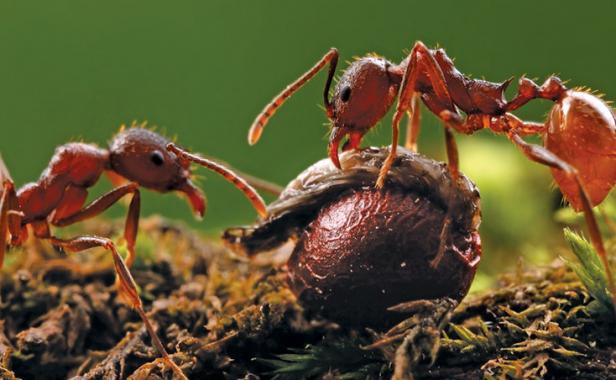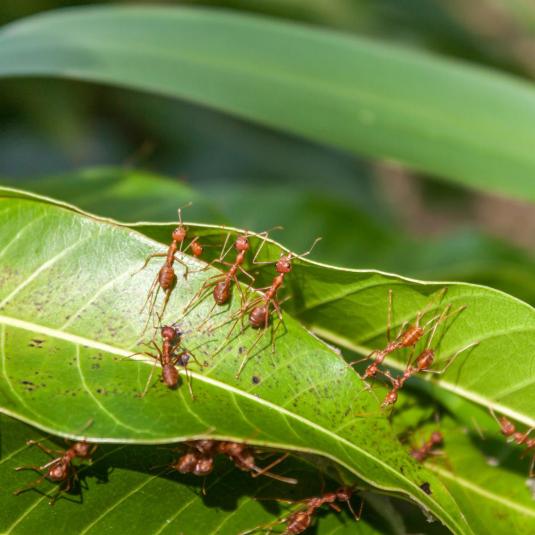Ants may affect your garden by building nests and farming aphids for their honeydew secretion. However, not all ant species are harmful, as some help in pollination and aerating soil.
Understanding the specific ant behavior in your garden can help you determine if their presence is beneficial or damaging. By taking the necessary steps to control ant populations and preserve a balanced ecosystem, you can maintain a healthy garden environment.
We will explore the potential impact of ants on your garden and provide effective strategies for managing ant activity without harming beneficial insects or plants. Let’s delve into the world of ants and their relationship with your garden.

Credit: www.pressenterprise.com
Types Of Ants In Gardens
Ants are a common sight in gardens, and while some types of ants can be beneficial for soil health and pest control, others can cause damage to plants and structures. Understanding the types of ants in gardens can help gardeners identify potential problems and take appropriate action. Let’s take a look at some common types of ants that can be found in gardens:
Black Garden Ants
Black garden ants, also known as Lasius niger, are a common sight in many gardens. These ants are generally not harmful to plants and can actually help with soil aeration and nutrient cycling. They are often seen foraging for food such as honeydew produced by aphids. However, in certain cases, they can become a nuisance, particularly when they establish nests close to homes or other structures.
Carpenter Ants
Carpenter ants are a larger species of ant that can cause significant damage to wooden structures. Instead of eating wood, they excavate it to create nests, which can weaken the integrity of decks, fences, and even trees in the garden. Identifying and addressing carpenter ant infestations early on is crucial to prevent costly damage.
Fire Ants
Fire ants are known for their painful stings and aggressive behavior, posing a threat to both humans and pets. In the garden, fire ants can construct large and unsightly mounds, and disturb the soil, potentially affecting the root systems of plants. Controlling fire ant populations is essential for maintaining a safe and harmonious garden environment.

Credit: www.thompson-morgan.com
Ants’ Impact On Plants
Ants are not just a nuisance in the garden; they can also have a direct impact on the health and well-being of your plants. Let’s explore how ants affect plants:
Damage To Roots
Ants can cause harm to plant roots by excavating soil around them, leading to root exposure and weakening of the plant.
Protection Of Aphids
Ants often protect aphids on plants, as they harvest the honeydew secreted by aphids, which can weaken the plant over time.
Disruption Of Pollination
Ants can disrupt pollination by feeding on nectar and deter pollinators from visiting the flowers of plants.
Ants’ Impact On Soil
Soil Aeration
Ants improve soil aeration by creating tunnels that allow better airflow.
Nutrient Circulation
Ants aid in nutrient circulation as they move organic matter through the soil.
Erosion Prevention
Ants play a role in preventing erosion by building stable underground structures.
Controlling Ants In The Garden
Controlling ants in the garden is crucial for maintaining the health and vitality of your plants. While ants can be beneficial in some cases, their presence can attract other pests and disrupt the delicate balance of the garden ecosystem. Let’s explore the various methods for effectively managing ants and preserving the well-being of your garden.
Natural Remedies
Using natural remedies to deter ants from your garden can be an environmentally friendly and effective approach. Some natural solutions include:
- Planting mint, tansy, or pennyroyal around the garden to repel ants with their strong aromas.
- Applying a barrier of diatomaceous earth or cinnamon around plant bases to create a deterrent for ants.
- Using citrus peels or coffee grounds to create a perimeter that ants avoid crossing.
Chemical Treatments
When natural remedies are not sufficient, chemical treatments can be employed to control ant populations. It’s important to use these methods cautiously and according to the manufacturer’s instructions. Common chemical treatments for ants in the garden include:
- Ant bait stations that contain sweet or protein-based baits to attract and eliminate ants.
- Spraying insecticidal soap or horticultural oil directly on ant trails and nests to disrupt their population.
- Utilizing ant dust or granular insecticides to target ant colonies and prevent their spread.
Attracting Beneficial Ants
When it comes to gardening, ants can be both a nuisance and a potential help. While some species of ants can damage your garden by feeding on plant roots or bringing aphids and other harmful insects, there are also beneficial ants that can contribute to a healthy garden ecosystem. By attracting these beneficial ants, you can harness their natural instincts to improve soil quality, pollination, and pest control. In this section, we will explore two key ways to attract and encourage beneficial ants in your garden: creating nesting sites and providing food sources.
Creating Nesting Sites
Beneficial ants, such as carpenter ants or native soil-dwelling ants, require suitable nesting sites to establish their colonies. To attract these ants to your garden:
- Leave some areas of bare ground or loose soil untouched, as they serve as ideal nesting spots for ground-dwelling ants.
- Place mulch or rocks in certain areas to create small dark spaces for ants to nest.
- Consider setting up ant houses or artificial nests designed specifically for attracting beneficial ants.
Providing Food Sources
Food availability plays a crucial role in attracting and maintaining beneficial ant populations in your garden. Here are some ways to provide food sources:
- Grow a variety of flowering plants that produce nectar-rich flowers, as these act as natural food sources for ants.
- Include plants that produce edible fruits or seeds, which can attract ants that aid in pollination and seed dispersal.
- Limit the use of pesticides, as they can harm both harmful and beneficial ant populations.
- Allow certain pest populations, such as aphids, to exist in small numbers, as they provide a source of honeydew, a sugary substance that ants feed on.
By attracting beneficial ants to your garden, you’ll create a balanced ecosystem where these ants can contribute to soil health, pollination, and natural pest control. Remember that not all ants are harmful, and with some careful planning and consideration, you can welcome these tiny garden allies into your outdoor space.

Credit: www.finegardening.com
Potential Risks Of Ant Infestation
While ants may seem harmless, they can actually pose several risks when they invade your garden. These tiny creatures can cause structural damage and contaminate your food, leading to various problems that can negatively impact your garden’s health and productivity. Understanding these risks is crucial in order to take effective measures to prevent and control ant infestations in your garden.
Structural Damage
Ant infestations in your garden can result in structural damage to your plants, trees, and even your garden ornaments. Certain ant species, such as carpenter ants, are notorious for burrowing into wood and creating tunnels, which weakens the structural integrity of wooden structures. They can cause severe damage to trees, making them more susceptible to disease and decay. If left uncontrolled, these ants can eventually cause irreparable harm to the overall aesthetics and functionality of your garden.
Contamination Of Food
Ants are always on the lookout for food sources, and your garden may contain an abundance of tempting treats for them. When these ants find access to your fruits, vegetables, or even pet food, they can contaminate it by leaving behind bacteria, pathogens, and unsightly trails of urine. This contamination can not only render your crops inedible but also pose health risks to you and your family if consumed. Therefore, preventing ant infestations in your garden is not only crucial for the wellbeing of your plants but also for maintaining the safety and quality of the food you grow.
Frequently Asked Questions For Will Ants Affect My Garden?
Are Ants Harmful To My Garden?
Ants are generally not harmful to your garden. In fact, they can even be beneficial as they help in the decomposition process and aerate the soil. However, certain species of ants can be destructive by building large nests and feeding on plant roots.
How Can I Prevent Ants from Affecting My Garden?
To prevent ants taking over world your garden, try planting mint, garlic, or cinnamon, as ants dislike the strong smells. Create barriers with coffee grounds, citrus peels, or diatomaceous earth. Keep the garden clean, free from standing water, and seal any cracks where ants can enter.
Conclusion
Ants can have both positive and negative effects on your garden. While they contribute to soil aeration and pest control, some species can damage plants and disrupt the garden ecosystem. It’s important to monitor ant activity and take appropriate measures to manage their impact on your garden.
{ “@context”: “https://schema.org”, “@type”: “FAQPage”, “mainEntity”: [ { “@type”: “Question”, “name”: “Are ants harmful to my garden?”, “acceptedAnswer”: { “@type”: “Answer”, “text”: “Ants are generally not harmful to your garden. In fact, they can even be beneficial as they help in the decomposition process and aerate the soil. However, certain species of ants can be destructive by building large nests and feeding on plant roots.” } } ] }
I’m MD Tanvir, and I bring years of expertise gained from working closely with pest control companies to the forefront. My journey in the industry has inspired me to launch Bug Battler, a platform aimed at equipping people with the know-how to combat pests autonomously. Through Bug Battler, I aim to empower individuals with practical insights to tackle pest infestations effectively.

